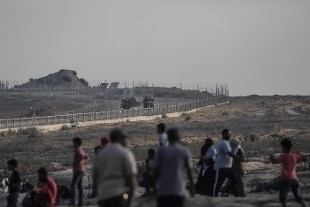- The UN to Israel: "No to annexation of parts of the West Bank". The US gives its go-ahead
Share
June 28, 2020A day of "popular anger" in protest against Israeli plans to annex parts of the West Bank was called today by various Palestinian political factions, following a coordination meeting in Gaza.
Mass protests, it was pointed out, will take place on July 1st. It is not yet known whether the demonstrations will take place only in the Strip or if the demonstrators will also try, as in the past, to reach the border with Israel.
UN Secretary General Antonio Guterres called on the "Israeli government to abandon its annexation plans" for parts of the West Bank, urging "Israeli and Palestinian leaders to engage in dialogue with support from the international community". "The annexation of parts of the occupied West Bank - said Guterres on Twitter - would constitute a serious violation of international law, would seriously damage the prospect of a two-state solution and would undermine the possibility of resuming negotiations". Obviously the US Secretary of State, Mike Pompeo, is not of the same opinion. Israel has the US go-ahead to annex Palestinian territories, he said. "Decisions on extending Israel's sovereignty to those areas are decisions that Israelis must make," Pompeo told reporters. The Secretary of State spoke a few moments after the UN and the Arab League joined the appeal to Israel to abandon its plans to annex parts of the occupied West Bank.
On June 10, the Israeli Supreme Court quashed the 2017 law that would legalize Jewish settlements in the West Bank built on Palestinian private land as "unconstitutional." The decision is based on the fact, writes the Court, that the law "violates the Palestinian property and equality rights while privileging the interests of Israeli settlers over Palestinian residents." It concerns about 4,000 houses built by settlers. The West Bank is part, together with the Gaza Strip, of the "Palestinian territories" and of the historical-geographical region of Palestine. With the Oslo agreements (1993) most of the West Bank was placed under the administration of the Palestinian National Authority, although Israel maintains settlements and build new ones, and despite the construction of a defensive barrier along the temporary border between the two states. In 2005, Israel implemented the unilateral withdrawal from Gaza alone, without removing the embargo on the entry of goods and people.

